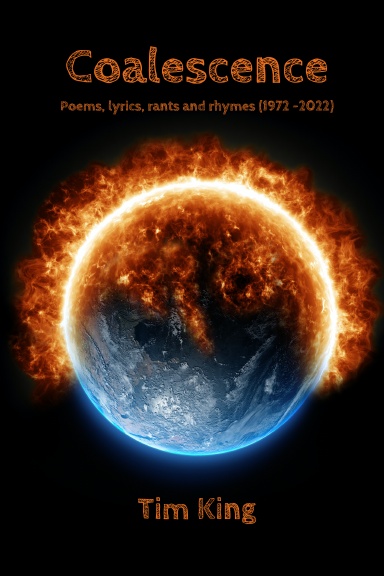
Coalescence by Tim King
Lulu Press
(230 pages of poetry)
Tim King can always be relied on to provide the perfect poetry pick-me-up that every writer longs for. ‘Coalescence’ is a glorious gallop through fifty years of jubilant, quirky and candid creativity. Linguistic larks abound as words are shaped and reshaped in all manner of unexpected ways. That is not to say that ‘Coalescence’ is merely a string of wisecracks; far from it, we are offered clear-sighted, pertinent and, at times, pithy analyses of our place on this planet.
The unassuming foreword sets the tone appropriately: it’s up to us how we proceed through this collection, he tells us, but, with Tim as our guide, why wouldn’t we wander along the same network of highways and byways that he has chosen for us? The collection’s subdivisions work well, offering a structure sturdy enough to support word and form but with sufficient flexibility to let each piece breathe.
‘Coalescence’ is an apt title in that of course things do make sense after fifty years but there is an inherent irony too in that ideas will never just fit conveniently into place: there is always another alleyway for Tim’s words to take us down, whether confessional, confrontational or conversational (or even all three). If Hamlet ponders ‘What is this quintessence of dust?’ Tim could easily reply ‘It’s a coal essence, mate,’ with a knowing wink.
There is fun to be had in the glorious word play but, equally, searing satire rips into politicians who simply don’t care. Because, above all, this is a collection that cares – cares what we say, what we do and what we intend to leave behind us. The compelling haiku that opens the first section ‘Induction’ sets the tone perfectly. We are all ‘stupid for beauty’ in our own ways, whether rendered stupid by it and for it.
Mention of a secret night in Tuscan villa and the warning that ‘this never – never ever – leaves the room’ paves the way for Sections Three and Four where the confessional edge to his words has a sharpness that gives voice to our yearning for ‘a different dawn’, tinged inevitably with the admission that ‘we are where we have always been.’ His song lyrics in Section Five, as is the case with all good lyrics, are wonderful poetic adventures in themselves. They may be mostly in G major, as Tim wryly comments, but span a wonderful kaleidoscope of subjects from psychedelic frogmen to a well full of bones to the darling of all poets, the oxymoron.
Sections Six, Seven and Eight broaden the range further to address issues of global significance, offering yet more opportunities for sharp-eyed dissection of the problems that beset us. Section Nine, with its celebration of performance poetry, takes us back to the opening haiku in Section One. The ‘poets assemble’ again and we are still unapologetically ‘stupid for beauty’ as we recall some of the spoken word artists who have cheered us with their wit and verve.
King confesses ‘all our conversations are of endings’ and that there is nothing left for us but to head to bed. But, as his wonderful collection has proved time and time again, there is much, much more to consider and to discuss. We are not left with the sadness of parting but the relief of being able to revisit these different sections again and again. In truth, we are only at the start of our conversation and if we listen well, we might just be part of a change that helps to achieve ‘a different dawn’. Now wouldn’t that be a marvellous thing?
Clare Morris is an award-winning poet, writer and spoken word artist from south-west UK. Her poetry collection Devon Maid Walking (Jawbone Collective), nominated for The Forward Prize, was published in March 2023.
